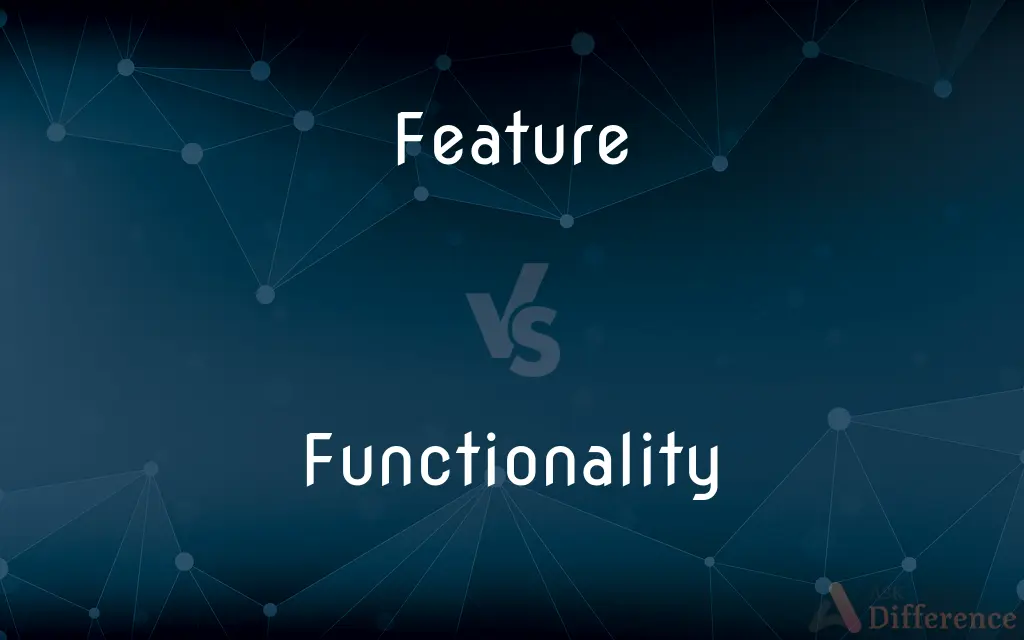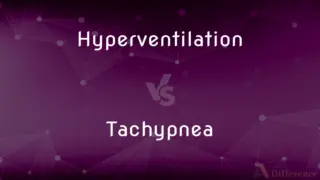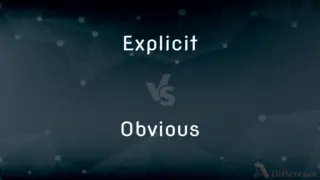Feature vs. Functionality — What's the Difference?
By Tayyaba Rehman & Urooj Arif — Updated on March 14, 2024
A feature is a distinctive attribute or aspect of a product or service, often adding to its appeal, while functionality refers to the range of operations or tasks that a product or service can perform, emphasizing its practicality and utility.

Difference Between Feature and Functionality
Table of Contents
ADVERTISEMENT
Key Differences
Features of a product or service are its characteristics that stand out, such as design elements, components, or capabilities that enhance its appeal or differentiate it from competitors. For example, a smartphone's feature could be its high-resolution camera or sleek design. Functionality, on the other hand, refers to what the product or service can actually do—its purpose and usefulness in practical terms. The smartphone's functionality includes making calls, browsing the internet, and running applications.
While features might attract users by highlighting what makes a product unique or superior, functionality focuses on the user experience, detailing how the product can be used to solve problems or fulfill needs. For instance, the feature of having a waterproof smartphone is appealing, but its functionality includes being able to use it in the rain or around water without damage.
The development of a product often begins with defining its functionality, outlining what it needs to do to meet user needs. Features are then developed to support or enhance this functionality, adding value and making the product more attractive to consumers. However, a product with numerous features but poor functionality might not meet users' needs effectively, underscoring the importance of balancing both aspects.
In terms of prioritization, functionality often takes precedence since it defines the core operations of the product or service. Features, while important for differentiation and marketability, are typically built around this core functionality to enhance or expand the product’s appeal and utility.
The distinction between features and functionality is crucial in design and development processes, as it helps teams focus on what the product needs to do (functionality) and how it does it or what additional attributes it has (features) to create a cohesive, user-centered product.
ADVERTISEMENT
Comparison Chart
Definition
Distinctive attribute or aspect enhancing appeal
Range of operations or tasks a product can perform
Focus
Attractiveness, uniqueness, differentiation
Practicality, utility, user experience
Purpose
To add value and appeal
To fulfill a need or solve a problem
Development
Built around functionality to enhance product appeal
Defines core operations and purposes of the product
Priority
Important for differentiation and marketability
Fundamental to meeting user needs
Compare with Definitions
Feature
A characteristic that contributes to the distinctiveness or attractiveness of a product.
The new car model boasts an advanced navigation system as one of its key features.
Functionality
The range of operations that can be performed by a device, system, or service.
The app's functionality includes tracking fitness activities and monitoring health metrics.
Feature
Any significant part or aspect of something.
User-friendly interfaces are a notable feature of the software.
Functionality
The set of functions or capabilities associated with a particular field or discipline.
The library's online catalog has expanded its functionality to include e-book downloads.
Feature
An element designed to provide comfort, convenience, or pleasure.
The hotel's pool is a popular feature among guests.
Functionality
The quality of being suited to serve a purpose well; practicality.
The kitchen's design prioritizes functionality with its efficient layout and easy-to-clean surfaces.
Feature
A special article or segment presented as part of a broadcast or publication.
The documentary features interviews with several renowned scientists.
Functionality
Actions or tasks that a user can perform with a tool or system.
The smartwatch's functionality makes it a versatile tool for managing daily tasks and receiving notifications.
Feature
Something offered as a special attraction.
This year's festival features performances by famous bands from around the world.
Functionality
The degree to which a complex system operates according to its design.
Testing ensures the software's functionality meets user requirements.
Feature
Any of the distinct parts of the face, as the eyes, nose, or mouth.
Functionality
The quality of being functional.
Feature
Often features The overall appearance of the face or its parts.
Functionality
A useful function within a computer application or program.
Feature
A prominent or distinctive part, quality, or characteristic
A feature of one's personality.
A feature of the landscape.
Functionality
The capacity of a computer program or application to provide a useful function.
Feature
A property of linguistic units or forms
Nasality is a phonological feature.
Functionality
(uncountable) The ability to do a task, performance, or execution; a set of functions that something is able or equipped to perform.
Feature
In generative linguistics, any of various abstract entities that specify or combine to specify phonological, morphological, semantic, and syntactic properties of linguistic forms and that act as the targets of linguistic rules and operations.
Functionality
In United States trademark law, the tendency of a product design to serve a function other than identification of the product, preventing that design from being protected as a trademark.
Feature
The main film presentation at a theater.
Functionality
The presence of a functional group.
Feature
A long, narrative movie, typically lasting more than one hour.
Functionality
Capable of serving a purpose well;
Software with greater functionality
Feature
A special attraction at an entertainment.
Feature
A prominent or special article, story, or department in a newspaper or periodical.
Feature
An item advertised or offered as particularly attractive or as an inducement
A washing machine with many features.
Feature
Outward appearance; form or shape.
Feature
Physical beauty.
Feature
To give special attention to; display, publicize, or make prominent.
Feature
To have or include as a prominent part or characteristic
The play featured two well-known actors.
Feature
To depict or outline the features of.
Feature
(Informal) To picture mentally; imagine
Can you feature her in that hat?.
Feature
(obsolete) One's structure or make-up: form, shape, bodily proportions.
Feature
An important or main item.
Feature
(media) A long, prominent article or item in the media, or the department that creates them; frequently used technically to distinguish content from news.
Feature
(film) feature film
Feature
Any of the physical constituents of the face (eyes, nose, etc.).
Feature
(computing) A beneficial capability of a piece of software.
Feature
The cast or structure of anything, or of any part of a thing, as of a landscape, a picture, a treaty, or an essay; any marked peculiarity or characteristic.
One of the features of the landscape
Feature
(archaeology) Something discerned from physical evidence that helps define, identify, characterize, and interpret an archeological site.
A feature of many Central Texas prehistoric archeological sites is a low spreading pile of stones called a rock midden. Other features at these sites may include small hearths.
Feature
(engineering) Characteristic forms or shapes of parts. For example, a hole, boss, slot, cut, chamfer, or fillet.
Feature
An individual measurable property or characteristic of a phenomenon being observed; the input of a model.
Feature
(music) The act of being featured in a piece of music.
Feature
(linguistics) The elements into which linguistic units can be broken down.
Feature
(transitive) To ascribe the greatest importance to something within a certain context.
Feature
(transitive) To star, to contain.
Feature
(intransitive) To appear, to make an appearance.
Feature
To have features resembling.
Feature
The make, form, or outward appearance of a person; the whole turn or style of the body; esp., good appearance.
What needeth it his feature to descrive?
Cheated of feature by dissembling nature.
Feature
The make, cast, or appearance of the human face, and especially of any single part of the face; a lineament. (pl.) The face, the countenance.
It is for homely features to keep home.
Feature
The cast or structure of anything, or of any part of a thing, as of a landscape, a picture, a treaty, or an essay; any marked peculiarity or characteristic; as, one of the features of the landscape.
And to her service bind each living creatureThrough secret understanding of their feature.
Feature
A form; a shape.
So scented the grim feature, and upturnedHis nostril wide into the murky air.
Feature
A prominent aspect of something;
The map showed roads and other features
Generosity is one of his best characteristics
Feature
The characteristic parts of a person's face: eyes and nose and mouth and chin;
An expression of pleasure crossed his features
His lineaments were very regular
Feature
The principal (full-length) film in a program at a movie theater;
The feature tonight is `Casablanca'
Feature
A special or prominent article in a newspaper or magazine;
They ran a feature on retirement planning
Feature
An article of merchandise that is displayed or advertised more than other articles
Feature
Have as a feature;
This restaurant features the most famous chefs in France
Feature
Wear or display in an ostentatious or proud manner;
She was sporting a new hat
Common Curiosities
Can a product feature also be considered functionality?
Yes, a feature can be seen as part of a product’s functionality if it directly contributes to what the product can do or how it can be used.
Why is functionality important in product design?
Functionality is crucial because it determines how well a product performs its intended tasks, impacting its usefulness and the overall user experience.
How do developers decide which features to add to a product?
Developers decide on features based on user feedback, market research, the need for differentiation, and how well they complement the product’s core functionality.
How do features and functionality affect user experience?
Both features and functionality directly impact user experience—features by providing additional value and attractiveness, and functionality by ensuring the product meets its intended use cases efficiently.
Is it better to prioritize features or functionality in development?
Prioritizing functionality is generally considered more important, as it ensures the product fulfills its basic purposes before additional features are added to enhance or expand its appeal.
How do changes in technology affect features and functionality?
Advances in technology can lead to new features and improved functionality, enabling products to perform more tasks, work more efficiently, or offer new benefits to users.
How do features contribute to a product's success?
Features contribute to a product's success by enhancing its appeal, differentiating it from competitors, and adding value that meets specific user needs or desires.
Can adding too many features affect a product’s functionality?
Yes, adding too many features can complicate a product, potentially affecting its core functionality and making it less intuitive or harder to use.
Can a product have high functionality but few features?
Yes, a product can have high functionality with few features if it performs its core operations well, even without many additional attributes.
What happens if a product has many features but poor functionality?
A product with many features but poor functionality may fail to meet users' basic needs, leading to dissatisfaction and possibly affecting its market success.
Share Your Discovery

Previous Comparison
Hyperventilation vs. Tachypnea
Next Comparison
Explicit vs. ObviousAuthor Spotlight
Written by
Tayyaba RehmanTayyaba Rehman is a distinguished writer, currently serving as a primary contributor to askdifference.com. As a researcher in semantics and etymology, Tayyaba's passion for the complexity of languages and their distinctions has found a perfect home on the platform. Tayyaba delves into the intricacies of language, distinguishing between commonly confused words and phrases, thereby providing clarity for readers worldwide.
Co-written by
Urooj ArifUrooj is a skilled content writer at Ask Difference, known for her exceptional ability to simplify complex topics into engaging and informative content. With a passion for research and a flair for clear, concise writing, she consistently delivers articles that resonate with our diverse audience.














































